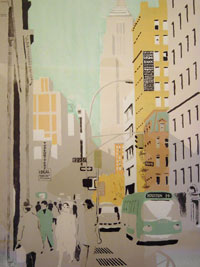 “The clock by the corner pointed to the hour of three, and Jesse Fineman had wanted to see him any time that afternoon in his office off Broadway. First he passed the restaurants on the corss street west and the windows of secondhand shops filled with bronze statuary and Arab pistols and all sorts of other articles which he could not imagine anyone’s wanting to buy. Then there were the small hotels with marble fronts and with palm trees in the lobbies. Then there were the subway entrances where the Interborough and the B.M.T. entwined beneath the street, and then Times Square. Broadway was always shabby in the afternoon. The electric signs stood nakedly against the sky like the frames of elaborate fireworks displays. Although Times Square was crowded, it all seemed half-asleep. The picture houses and the drugstores and the newsstands never seemed to try in the afternoon.
“The clock by the corner pointed to the hour of three, and Jesse Fineman had wanted to see him any time that afternoon in his office off Broadway. First he passed the restaurants on the corss street west and the windows of secondhand shops filled with bronze statuary and Arab pistols and all sorts of other articles which he could not imagine anyone’s wanting to buy. Then there were the small hotels with marble fronts and with palm trees in the lobbies. Then there were the subway entrances where the Interborough and the B.M.T. entwined beneath the street, and then Times Square. Broadway was always shabby in the afternoon. The electric signs stood nakedly against the sky like the frames of elaborate fireworks displays. Although Times Square was crowded, it all seemed half-asleep. The picture houses and the drugstores and the newsstands never seemed to try in the afternoon.
“Nothing Jeffrey saw had changed much from the way he first remembered it. There was the same cynicism, the same disregard for sobriety, the same combined efforts of millions of people to escape from what troubled them. It was all pathetic like every fallacy, but at least it was not new.
“‘Plenty of seats in just a minute,’ the men in the horizon-blue uniforms were saying. ‘The main picture will be over in three minutes. Seats now only in the mezzanine.’
“The police whistles were blowing, crowds were streaming solidly across the street. It was all more permanent than Fifth Avenue–timeless, too complicated to understand, but then, there was no reason to understand it.”
John P. Marquand, So Little Time
Terry Teachout on the arts in New York City
